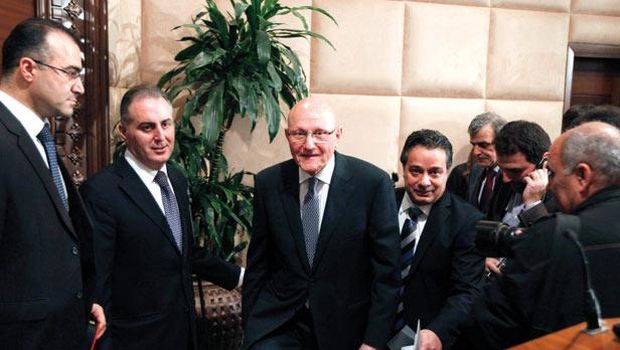
Lebanon’s Prime Minister Tammam Salam, center, walks at the presidential palace in Baabda, near Beirut, on February 14, 2014. (Reuters)
Beirut, Asharq Al-Awsat—Following the formation of Lebanon’s new Cabinet on February 15, the committee to reach consensus on a final draft of the country’s Ministerial Statement have failed to reach consensus.
The current impasse is mainly due to the March 8 Alliance—which includes Hezbollah—insisting on adhering to the statement in its current form, while the March 14 Alliance insists on incorporating the Baabda Declaration as the main article of the Ministerial Statement.
The Baabda Declaration, signed in 2012 by all the country’s political parties and championed by President Michel Suleiman, calls for neutrality on the part of Lebanon in external conflicts, particularly the Syrian conflict.
A source from the government, speaking on the condition of anonymity, told Asharq Al-Awsat: “Lebanese President Michel Suleiman expressed hope that the statement will include the Baabda Declaration, which stipulates Lebanon’s impartiality.”
The Statement—which includes articles Lebanon’s involvement in external conflicts—has been the main obstacles to previous governments due to the insistence of Hezbollah and the March 8 Alliance on the inclusion of the expression, “Army, People, Resistance.”
The source said he expected that a solution would be agreement on the phrase “Lebanon’s right to resistance.” That had not been on the table before Tuesday evening’s session.
Lebanese Hezbollah MP Nawwaf Al-Mousawi alluded to this potential compromise when referring to the tripartite expression, “Army, People, Resistance.”
He said: “The resistance and its achievements are a rooted part of Lebanese national history, and are among the constants of the National Accord Charter, and one of the pillars of coexistence. Therefore, it is only natural that the government, like other governments before it, would express in its Ministerial Statement its adherence to the right of the Lebanese to resist the occupation, aggression and Israeli threats.”
The committee on Tuesday recommended a number of proposals, including a new format presented by Health Minister Wael Abu Faour—who is from Walid Jumblatt’s camp—and which included the non-contentious issues in the Baabda Declaration, moving the neutrality clause to another, independent article.
However, before the start of the session, Finance Minister Hassan Khalili dismissed the chance of Abu Faour’s proposal being accepted. He said: “We want a statement which is agreeable, but not one which departs from the constants, and I do not think the new Abu Faour proposal is workable.”
At a meeting of the ambassadors of a number of donor countries attended by the UN and Arab League envoys, representatives of the UN development program, the World Bank and the UNHCR, President Suleiman expressed hope that the Ministerial Statement would be drafted in time and that the government would win the vote of confidence before the Paris Conference due to be held on March 5–6.
Labor Minister and deputy leader of the Phalange Party, Sajaan Qazzi, who is a member of the Ministerial Statement Committee, said the meetings were calm and objective despite differences on some issues.
He added that the discussions had settled most of the Ministerial Statement, while two important points were still being discussed—the Baabda Declaration and the resistance.
He said: “We have a great sense of responsibility which makes us think of acceptable formats, as long as they are not at the expense of principles, sovereignty or the state.”
Future Alliance MP Ammar Houri reiterated his side’s insistence on the Baabda Declaration, saying: “We announced from the start that we would not give up the Baabda Declaration in the Ministerial Statement, because this declaration reflects the national consensus on the constitution, the Taif Agreement and coexistence, in addition to a consensus on all national constants, which consequently means it is illogical to give it up, especially after it won a consensus at the negotiation table.”
If agreement is not reached, the current government could be dissolved if the 30-day constitutional deadline set by parliament expires.
